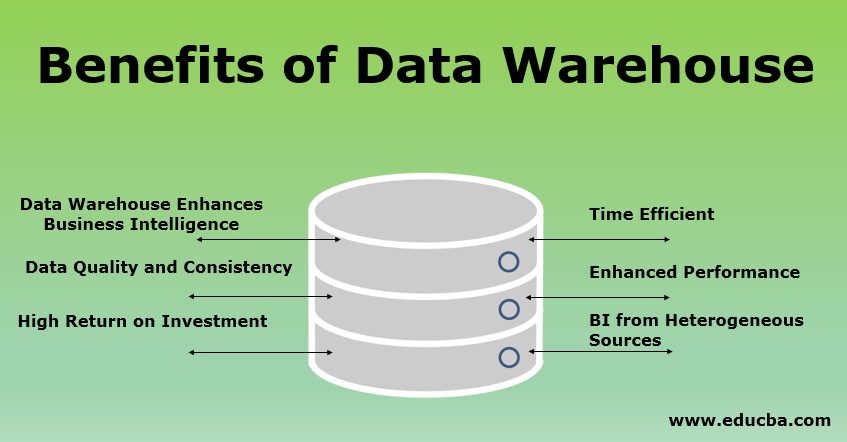
Introduction to Benefits of Data Warehouse
Application of a Data Warehousing system in any organization has immense advantages, as it is the main source of input material for Business Intelligence. The most common reasons for organizations to pick the Data Warehouse are ‘prompt access to the data,’ ‘higher data quality with reliability and low or zero redundancy,’ ‘enables superior business decision-making,’ ‘lower time consumption,’ ‘stores or archives historic data for later uses,’ ‘progressive performance,’ ‘one-stop shop for Integrated data from multiple sources,’ ‘improved productivity due to instantaneous decision-making,’ etc.
Benefits of Data Warehouse to the Corporate World
The benefits of Data Warehouse provides to the Corporate World are as follows:
1. Data Warehouse Enhances Business Intelligence
Using different data sources for a data warehouse helps collect more relevant data. It helps decrease the error frequency by continuously matching the new data with the previously collected data. After certain formatting and processes, the data is so consistent that it is ready to be analyzed. The quality of data helps the decision-maker base their decisions on hard facts. Now the authorities don’t rely upon incomplete or poor data quality. According to Exforsys, the increase in the business intelligence we get through data warehousing can directly be applied to market segmentation, inventory management, and sales.
2. Data Quality and Consistency
An integrated database of consistent, relevant, and historical data helps analysts increase work efficiency and provide more accurate business insights. The organization’s Historical data helps study and analyze the different periods and trends to make better predictions for the future. A Data Warehouse also helps consistently accumulate and integrate a high amount of data, eventually reducing the stress on the production system. It helps in offloading data extracts and reporting from the production server. Accessing the data directly through the Data warehouse eliminates the dependency on SSIS packages. Consistent information from various activities or departments of a certain organization helps understand the trends. Also, it helps in recognizing the mistakes made and correcting them before feeling the dent.
3. High Return on Investment
Data warehousing is expensive regarding revenue generation but produces quality results with time. Data warehousing in its early phase demands a fortune, but it can help the organization grow exponentially with time. According to the International Data Corporation, an average of three years of return on investment in data warehousing reached 401% in 1996.
4. Time Efficient
Data warehousing enables the decision-makers to quickly access critical data from different sources all in one place. Now the authorities don’t need to waste time collecting data from multiple sources, enabling them to make efficient decisions quickly. With the establishment of a Data Warehouse, the business executives need no support from IT to bring up the data. Rather they can easily execute queries for the data required.
5. Enhanced Performance
With the increase in the speed of data retrieval and data analysis, we can store a large amount of data and can also query rapidly. The operating system is not designed specifically for collecting and analyzing data. Instead, data warehouses are purpose-built for those tasks. Implementing a data warehouse and simplified data models eases report creation and helps create custom reports for specific needs. If used with advanced SQL functionalities, it helps optimize the database performance.
6. BI from Heterogeneous Sources
Many subsystems of an organization are physically different and based on different platforms. In Business Intelligence, there is a need for merging data from heterogeneous sources. A Data warehouse integrates and makes these data accessible in a single place. Accumulating all of an organization’s data into a single container decreases data duplication, which makes a data warehouse a single view of a story rather than multiple stories with multiple meanings.
After learning how a Data Warehouse benefits an organization, let us go through a case study of a real-world problem and its solutions in a data warehouse.
An Electric Holding Company in the US
- Business Problem – Energy Trading Systems for various submarkets were not integrated, resulting in detailed and fragmented reporting features. The business needed to be combined multi-leveled trading transaction data with risk measures for Risk and Market to Market Analysis.
- Solution Provided – A web-based risk reporting portal was implemented. It was based on customer requirements, including reports with a hierarchical security model. The organization allowed different roles to see the other data aggregations. The system provided a single set of reports, which helped give a different view based on the user’s job function and line of business focus. At the highest level, the corporation could see its entire energy portfolio and evaluate various energy trading instruments with hedging strategies.
This case study helps us acknowledge how a data warehouse simplifies an organization’s business model and helps gain more business growth through more efficient insights from the organization’s data over time.
Conclusion
In this article, we learned about Data Warehouses and their benefits in the current market scenario and how a Data Warehouse helped an Electric Holding Company simplify its Business problem and helped decision-makers gain some beneficial insights.
Recommended Articles
This is a guide to the Benefits of Data Warehouse. Here we discuss the introduction and the benefits of Data Warehouse of the Corporate World. You can also go through our other suggested articles to learn more–

